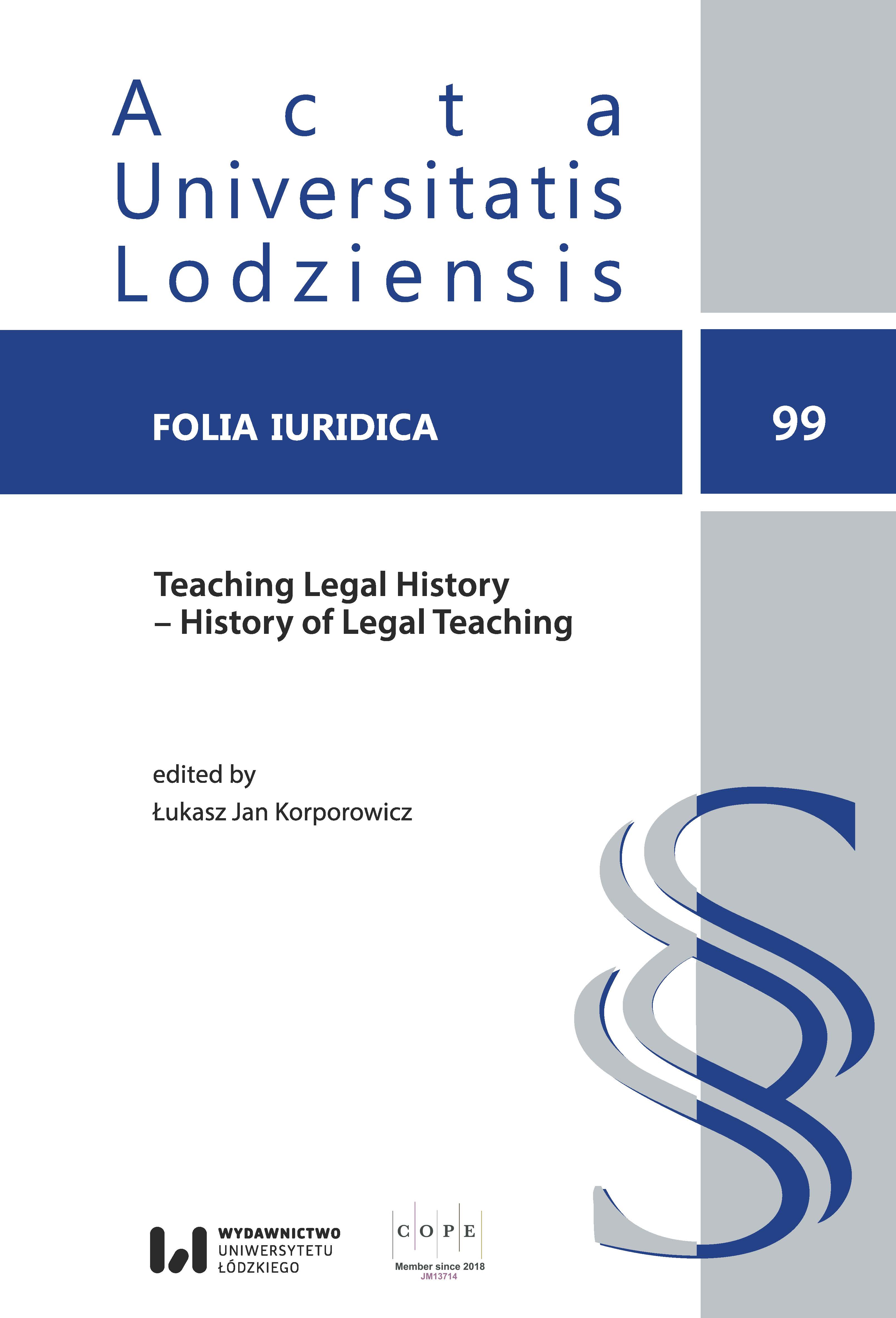Thinking Like a Lawyer: The Case for Roman Law
DOI:
https://doi.org/10.18778/0208-6069.99.12Keywords:
Roman law, legal doctrine, American legal realism, law and society, socio-legal studiesAbstract
The aim of this piece is to present an overview of certain recent trends which have emerged in the study and teaching of Roman law. These trends are identified and placed within the larger context of the role and function of the teaching of Roman law in Law Schools during the twentieth century. In addition, it is argued in this piece that trends regarding the study of Roman legal sources which have emerged in the context of U.S. Law Schools have the potential to enrich the discipline and to permit new questions to be asked about Roman law.
Downloads
References
Babusiaux, Ulrike. 2016. “The Future of Legal History: Roman Law.” The American Journal of Legal History 56(1): 6–11. https://doi.org/10.1093/ajlh/njv008
Google Scholar
DOI: https://doi.org/10.1093/ajlh/njv008
Beiser, Frederick C. 2015. The German Historicist Tradition. Oxford: Oxford University Press.
Google Scholar
Bryen, Ari Z. 2014. “Law in Many Pieces.” Classical Philology Classical Philology 109(4): 346–365. https://doi.org/10.1086/677860
Google Scholar
DOI: https://doi.org/10.1086/677860
Calavita, Kitty. 2010. Invitation to Law & Society: An Introduction to the Study of Real Law. Chicago: University of Chicago Press. https://doi.org/10.7208/chicago/9780226089980.001.0001
Google Scholar
DOI: https://doi.org/10.7208/chicago/9780226089980.001.0001
Coing, Helmut. 1973. “Roman law as ius-commune on continent.” Law Quarterly Review 89(356): 505–517.
Google Scholar
Dubber, Markus D. Christopher Tomlins. Eds. 2018. The Oxford Handbook of Legal History. New York: Oxford University Press. https://doi.org/10.1093/oxfordhb/9780198794356.001.0001
Google Scholar
DOI: https://doi.org/10.1093/oxfordhb/9780198794356.001.0001
Frier, Bruce W. 1989–1990. “Autonomy of Law and the Origins of the Legal Profession.” Cardozo Law Review 11(2): 259–286.
Google Scholar
Giaro, Tomasz. 1993. “Europa und das Pandektenrecht.” Rechtshistorisches Journal 12: 326–345.
Google Scholar
Haferkamp, Hans-Peter. Klaus Luig. Tilman Repgen. 2017. Wie pandektistisch war die Pandektistik? Symposium aus Anlass des 80. Geburtstags von Klaus Luig am 11. September 2015. Tübingen: Mohr Siebeck. https://doi.org/10.1628/978-3-16-155459-9
Google Scholar
DOI: https://doi.org/10.1628/978-3-16-155459-9
Hoeflich, Michael H. 1984. “Roman and Civil Law in American Legal Education and Research Prior to 1930: A Preliminary Survey A Symposium in Legal History: American Legal History: Revisionist Viewpoints.” University of Illinois Law Review 3: 719–738.
Google Scholar
Jhering, Rudolf von. 1985. “In the Heaven for Legal Concepts: A Fantasy.” Temple Law Quarterly 58: 799–842.
Google Scholar
Letwin, Shirley Robin. 2009. On the History of the Idea of Law. Cambridge: Cambridge University Press.
Google Scholar
Osler, Douglas J. 2007. “The Fantasy Men.” Rechtsgeschichte – Legal History 10: 169–192. https://doi.org/10.12946/rg10/169-192
Google Scholar
DOI: https://doi.org/10.12946/rg10/169-192
Plessis, Paul du. 2019. “A Festschrift for Bruce Frier on Ancient Law and Society.” Journal of Roman Archaeology 32: 648–655. https://doi.org/10.1017/S1047759419000485
Google Scholar
DOI: https://doi.org/10.1017/S1047759419000485
Pölönen, Janne. 2006. “The Case for a Sociology of Roman Law.” In Law and Sociology. Edited by Michael Freeman. 398–408. Oxford: Oxford University Press.
Google Scholar
DOI: https://doi.org/10.1093/acprof:oso/9780199282548.003.0022
Schiller, A. Arthur. 1978. Roman Law Mechanisms of Development. The Hague–New York: Mouton. https://doi.org/10.1515/9783110807196
Google Scholar
DOI: https://doi.org/10.1515/9783110807196
Stein, Peter. 1999. Roman Law in European History. New York: Cambridge University Press. https://doi.org/10.1017/CBO9780511814723
Google Scholar
DOI: https://doi.org/10.1017/CBO9780511814723
Stein, Peter G. 2007. “The Roman Jurists’ Conception of Law.” In A Treatise of Legal Philosophy and General Jurisprudence. Edited by Andrea Errera, Andrea Padovani, Kenneth Pennington, Peter Stein. Vol. 7: 1–30. Dordrecht: Springer Netherlands. https://doi.org/10.1007/978-94-017-9880-8_1
Google Scholar
DOI: https://doi.org/10.1007/978-94-017-9880-8_1
Van Hoecke, M. François Ost. 1998. “Legal Doctrine in Crisis: Towards a European Legal Science.” Legal Studies: The Journal of the Society of Public Teachers of Law 18(2): 197–215. https://doi.org/10.1111/j.1748-121X.1998.tb00013.x
Google Scholar
DOI: https://doi.org/10.1111/j.1748-121X.1998.tb00013.x
Watson, Alan. 1977. Society and Legal Change. Edinburgh: Scottish Academic Press.
Google Scholar
Watson, Alan. 1983. “Legal Change: Sources of Law and Legal Culture.” University of Pennsylvania Law Review 131(5): 1121–1157. https://doi.org/10.2307/3311936
Google Scholar
DOI: https://doi.org/10.2307/3311936
Winkel, Laurens. 2015. “Roman Law and Its Intellectual Context.” In The Cambridge Companion to Roman Law. Edited by David Johnston. 9–22. New York: Cambridge University Press. https://doi.org/10.1017/CCO9781139034401.003
Google Scholar
DOI: https://doi.org/10.1017/CCO9781139034401.003
Zimmermann, Reinhard. 1996. “Savigny’s Legacy. Legal History, Comparative Law, and the Emergence of a European Legal Science.” The Law Quarterly Review 112: 576–605.
Google Scholar
Published
How to Cite
Issue
Section
License

This work is licensed under a Creative Commons Attribution-NonCommercial-NoDerivatives 4.0 International License.














